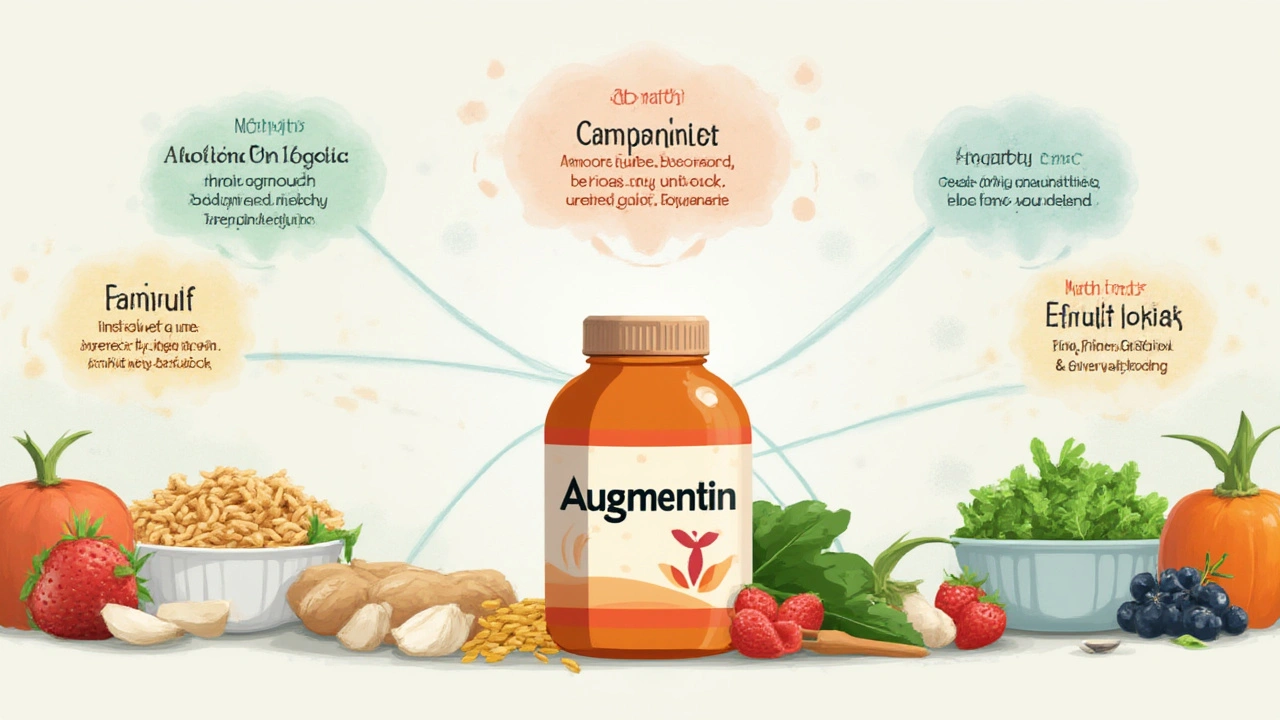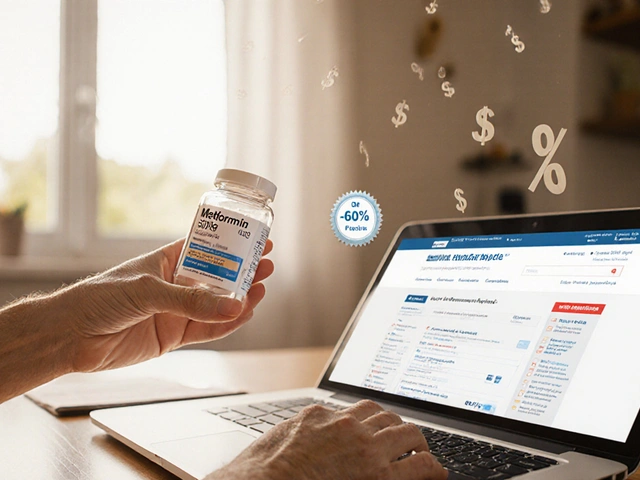Pop an antibiotic, and the world expects instant results. Yet, as Augmentin (amoxicillin with clavulanate) sits on kitchen counters across the globe, people are hunting for ways to make it work better—or even dodge its notorious side effects. Enter natural adjuncts: probiotics you find in Greek yogurt commercials, herbal teas your aunt swears by, or the nutritionist touting kale smoothies. Do these add-ons truly help, or are we drinking the wellness Kool-Aid?
Why People Pair Natural Adjuncts with Augmentin
What actually happens when your body meets Augmentin? It’s a powerful tool—effective against loads of nasty bacteria from sinus and ear infections to stubborn UTIs. But it doesn’t care if you’re the ‘good kind’ of bacteria living peacefully in your gut. Diarrhea, yeast infections, bloating, and gut chaos can be the price. That’s where the notion of "adjuncts" swoops in: things you stack with your medication, hoping to protect your gut, speed up recovery, or just feel less wiped out.
In 2024, a survey from Johns Hopkins found over half of antibiotic users had tried at least one adjunct, usually spurred by advice from friends, social media, or alternative health sites. Strikingly, one in three of these people skipped prescribed drugs altogether, experimenting with herbal concoctions instead—often with mixed results.
Why so much interest? Antibiotic resistance is everywhere in health headlines. On top of that, nobody likes feeling roped into a course of pills and then dealing with side effects. If there’s even a whisper that something natural offers relief or boosts efficacy, people grab it.
Probiotics: Fad or Friend?
Probiotics are usually the first line of defense when someone mentions "supporting the gut" during antibiotic treatment. You’ve seen the claims: pop a probiotic, and you can eat pizza with abandon. But let’s look past the hype.
The most widely studied strains—Lactobacillus rhamnosus GG and Saccharomyces boulardii—show real promise in reducing antibiotic-associated diarrhea. In a 2023 meta-analysis out of Stanford, people who started a probiotic within two days of beginning Augmentin had 35% lower risk of gut-twisting side effects compared to those on antibiotics alone. But here’s the catch: not all probiotics work, and the supermarket shelf is loaded with strains that haven’t been tested with antibiotics like Augmentin.
Timing also matters. If you swallow your probiotic next to the antibiotic, chances are the medication will wipe out those helpful bacteria, too. Most clinicians suggest taking them three or four hours apart. Yogurt, kefir, or kombucha? Delicious, but the number of live bacteria is a wild guess, and they may not be the types your gut actually needs.
One simple tip: look for brands that state the strain and proof of stability up to expiration. And don’t expect miracles—probiotics are a support act, not headliners.
| Common Probiotic Strains | Evidence with Augmentin |
|---|---|
| Lactobacillus rhamnosus GG | Reduces diarrhea, most support in research |
| Bifidobacterium lactis | Gut health, but less evidence with antibiotics |
| Saccharomyces boulardii | Yeast-based, lowers GI disturbances |

Herbal Extracts: What the Science (and Stories) Say
Turmeric lattes and ginger tea may get your Instagram likes, but can any herb seriously compete with pharmaceutical antibiotics? Well, some classics get high marks—for example, garlic contains allicin, shown in the lab to slow or even kill several bacteria. Oregano oil, a superstar in essential oil circles, boasts carvacrol and thymol, which have shown bactericidal effects in Petri dishes. Yet, what happens in a dish is not what happens in your body, where stomach acid and metabolism step in.
Worryingly, a chunk of the herbal market lacks quality control. A 2023 analysis by the FDA found up to 40% of herbal products tested didn’t contain the herbs listed on their labels.
Still, herbal extracts might play a role when used alongside, not instead of, prescribed antibiotics. Several small clinical trials found that echinacea, elderberry, and green tea can boost immune signaling or soothe symptoms, but there’s no hard proof these herbs directly enhance Augmentin’s kill rate against bacteria in humans. In fact, some can interact badly—St. John’s Wort, for example, can ramp up liver enzyme activity, possibly lowering Augmentin levels in your bloodstream. If you’re tempted to add herbal extracts, check with a professional who knows both worlds: medicine and natural health.
- If you do try herbs, stick to short-term use and watch for allergies.
- Prioritize quality brands with third-party testing (USP, NSF).
- Never use herbal extracts as a solo replacement for antibiotics in serious infections.
Diet Tweaks That Help (or Hurt) Antibiotic Success
Food is powerful—no therapist will argue with that. During an antibiotic course, the real challenge is balancing enough nourishment to support healing without accidentally messing with how Augmentin works.
Some foods clash with antibiotics. For Augmentin, heavy calcium (think milk, cheese) taken at the exact same time as your dose can slightly slow absorption—but not enough to miss a dose; just don’t chase your pill with a latte. Grapefruit, which trips up many drugs, doesn’t interact with Augmentin. But alcohol can worsen side effects (nausea, dizziness), so moderation matters.
Want to feed your gut protection team? Lean into fiber: oats, bananas, asparagus, and apples all give your good bugs something to chew on, helping them rebuild. Crucially, dehydration is often overlooked—drinking enough water keeps meds moving and flushes toxins.
Meanwhile, sugar and processed foods can feed the “bad” bacteria, slowing recovery. If you’re tempted by comfort food, go for broth-based soups or yogurt rather than sugary snacks.
| Food | Impact on Augmentin or Gut Health |
|---|---|
| Yogurt (no added sugar) | Supports probiotics, may ease diarrhea |
| Oats, bananas | Prebiotic fiber, helps gut bacteria regrow |
| Milk, cheese | Can slow absorption if taken with antibiotics |
| Alcohol | May worsen side effects |
| Sugary foods | Feeds harmful gut bacteria |

When to Skip Natural Adjuncts—and What to Watch Out For
The lure of "natural is always better" doesn’t hold up, especially when battling serious bacterial infections. Some supplement makers oversell benefits—and dangerously underplay risks. In rare cases, probiotics can cause infections in severely immunocompromised people. Herbal extracts can mess with clotting, blood pressure, or hormones. For kids, elderly, and anyone on multiple meds, this is no trivial matter.
So, when is simple better? If your infection is mild, your diet is balanced, and your main goal is avoiding side effects like diarrhea, a researched probiotic and basic diet tweaks offer the most, with lowest risk. If you're taking Augmentin for something severe—like pneumonia—skip the distractions and stick tightly to prescription advice.
And if you want to find something outside mainstream antibiotics? There’s been growing interest in alternatives to Augmentin, especially in the wake of antibiotic resistance and personal sensitivities. Explore those only with professional guidance, as what works in theory doesn’t always pan out in practice.
- Never stop prescribed antibiotics early, even if you feel better.
- Tell your doctor about any supplements or herbs you use.
- Be careful with combinations if you have allergies or chronic conditions.
Bottom line: there’s no silver bullet, but the right adjunct at the right time can help—if you pick wisely, stay realistic, and keep all your doctors in the loop.







Sondra Johnson
12 July, 2025 12:39 PMI took Augmentin last winter for a sinus infection and swore by the probiotic gummies my yoga teacher gave me-turned out they were just sugar with a sprinkle of L. rhamnosus. Still, my stomach didn’t explode like last time. Not magic, but maybe… a tiny mercy?
Also, don’t even get me started on that ‘herbal immunity booster’ tea that tasted like burnt grass. I drank it for three days. My immune system didn’t thank me. My taste buds are still in therapy.
Luke Webster
14 July, 2025 06:23 AMThere’s something deeply human about trying to outsmart medicine with kale and kombucha. We want control, especially when our bodies feel like they’ve been hijacked by a bacterial takeover.
I’ve seen grandmas in rural Tennessee brew garlic honey syrup for every sniffle. It’s not evidence-based, but it’s rooted in care. Maybe that’s the real adjunct-the ritual of trying to heal, not just the strain count on a capsule.
Still, if you’re wheezing and feverish? Skip the turmeric latte. Take the pill. Your lungs don’t care about your aesthetic.
Tiffany Fox
15 July, 2025 00:33 AMProbiotics 3 hours after Augmentin. That’s the rule. No excuses.
And drink water. Like, a lot.
Rohini Paul
16 July, 2025 12:08 PMBack home in Kerala, we use neem leaves boiled in water for infections. My mom says it’s like nature’s penicillin. I didn’t believe her until I got sick in college and tried it. Felt weird, tasted worse, but the fever broke faster than the pharmacy’s antibiotics ever did.
Could’ve been placebo. Could’ve been the hydration. Or maybe, just maybe, the plant knew something the lab didn’t.
Still wouldn’t swap Augmentin for it though. Just… maybe as backup?
Courtney Mintenko
18 July, 2025 00:33 AMProbiotics are a scam sold by people who think your gut is a TikTok influencer
Herbs? More like placebo with a side of legal liability
And don’t even get me started on ‘prebiotic fiber’-you’re not feeding your microbiome, you’re just feeding your guilt about eating donuts
Antibiotics are the only thing that kills bacteria. Everything else is performance art for anxious millennials
Sean Goss
18 July, 2025 21:11 PMMeta-analysis? Stanford? That’s not peer-reviewed rigor-that’s a grad student scraping together a p-value from a 2023 Cochrane spinoff.
Probiotics have zero standardized dosing, and the FDA doesn’t regulate them like drugs. You’re essentially gambling with bacterial RNG.
And don’t even mention ‘gut health’-that’s a marketing term invented by yogurt companies to sell overpriced dairy.
Augmentin works because it’s pharmacologically validated. Everything else is noise.
Khamaile Shakeer
19 July, 2025 04:24 AMBro… probiotics? 😒
My cousin took Augmentin + 7 different herbal tinctures + a 10-day juice cleanse…
He ended up in the ER with C. diff.
Don’t be that guy. 🤡
Also, garlic oil? That’s like trying to fight a tank with a rubber chicken. 🍄
John Kang
21 July, 2025 02:59 AMListen, if you’re feeling shaky or bloated after starting Augmentin, don’t panic
Just take your probiotic 3 hours later, drink water, eat a banana, and chill
It’s not about fixing everything-it’s about giving your body space to heal
You got this
Natalie Sofer
21 July, 2025 15:56 PMWait, I just read this and realized I’ve been taking my probiotic right after my antibiotic… like, every single day for two weeks 😳
So that’s why I felt like a swamp monster?
Thanks for the 3-hour tip. I’m switching it up tonight. Also, I’ve been eating yogurt with sugar because I like it… now I’m gonna go buy the plain stuff. 🙏
Also, I didn’t know grapefruit was safe-my doctor told me to avoid citrus. So now I’m confused. But I’ll ask my pharmacist tomorrow. I promise I’ll ask.
And I’m not drinking alcohol anymore. Not even one glass. For science.
Suryakant Godale
22 July, 2025 05:59 AMWhile the empirical evidence supporting adjunctive probiotic use during Augmentin therapy is modest yet statistically significant, it is imperative to acknowledge the heterogeneity of commercial formulations and the absence of standardized dosing protocols. Furthermore, the pharmacokinetic interactions between phytochemical constituents and beta-lactam antibiotics remain inadequately characterized in human trials. One must exercise caution, particularly in geriatric populations with polypharmacy, wherein unintended metabolic interference may precipitate clinically significant adverse events. The foundational principle remains: adjunctive modalities should complement, not supplant, evidence-based antimicrobial regimens. Consultation with a licensed clinical pharmacist is strongly advised prior to implementation.